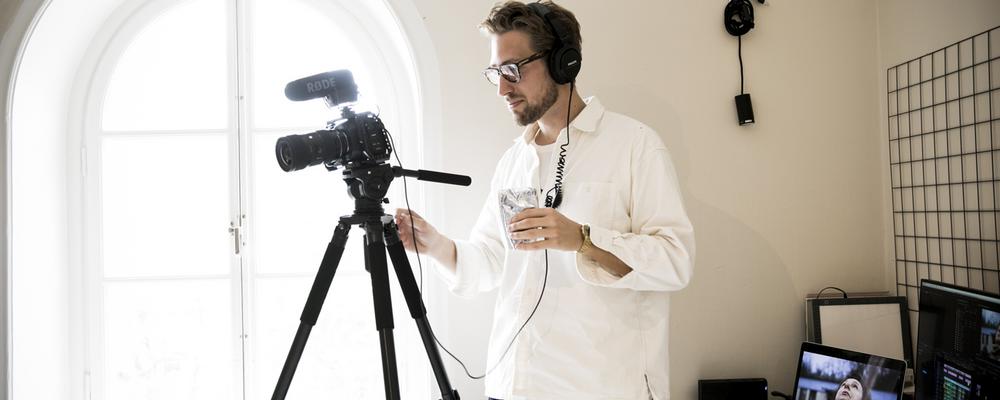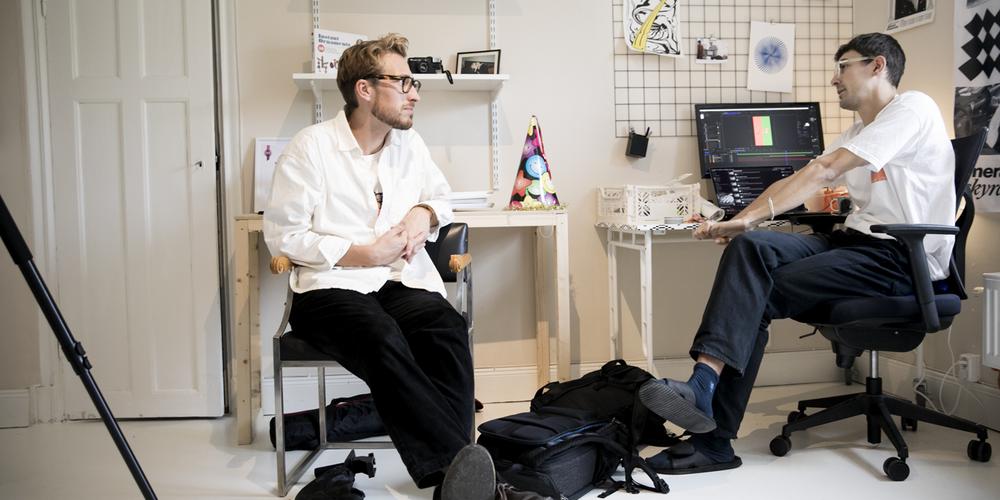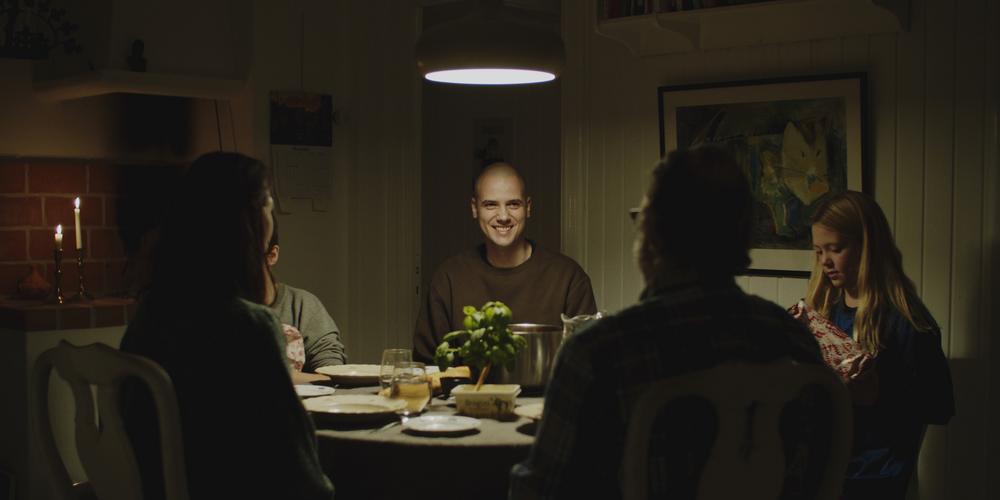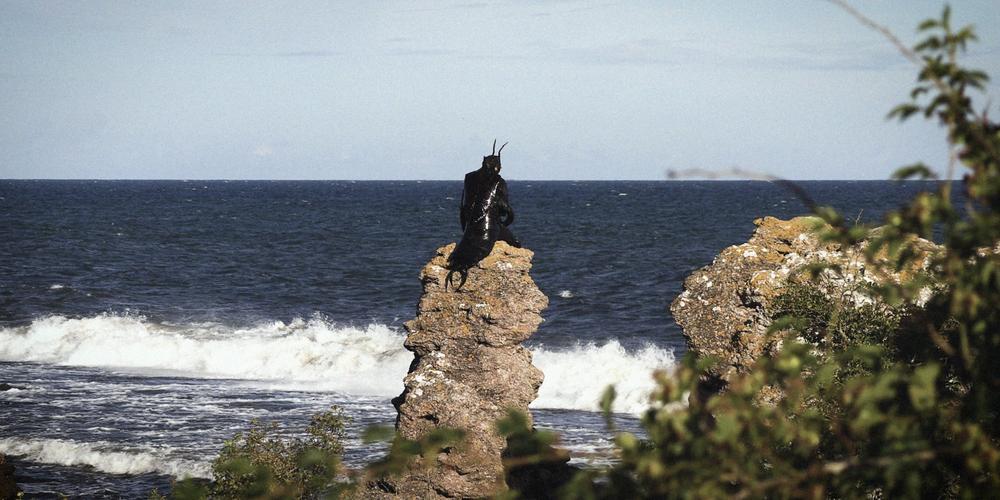
- Home
- News and events
- Find news
- Celebrated Filmmaker Focuses on Groups
Celebrated Filmmaker Focuses on Groups
The Swedish Film Institute thinks he’s a wild card. Immediately after graduating from HDK-Valand’s bachelor's programme in film, Sebastian Johansson Micci was awarded their special grant for recently graduated directors with a unique film voice. Now he’s brought his cameras and editing equipment along and moved into a little attic studio in Stockholm to work on his first full-length film.
On either side of an arched window, with their backs to each other, sit filmmaker Sebastian Johansson Micci and art director Ivan Gedin, working away at big screens.
“Having an office makes my job real,” says Sebastian. “It gives it a feeling of legitimacy and lends structure to the daily routine. It’s totally fantastic!”
For the last week he’s been sharing this office with his friend Ivan. They found their dream space under these rafters in the Aspudden neighbourhood south of Södermalm. It’s an attic that has been converted into an office, with white walls, floor and ceiling and an inviting window niche to crawl into for a big view over the park.

There’s a smell of coffee coming from the pantry. Ivan rolls his chair over to join his partner for a look at one of Sebastian’s scenes in a short film they need to rework. They talk back and forth a little before Ivan rolls back to his side again.
“We try to work together on different projects, and we’re always going back and forth with each other on thoughts and ideas,” says Sebastian. “That’s something else I got from HDK-Valand: the importance of discussing my work with others.”
Playfulness instead of set templates
Sebastian graduated from HDK-Valand’s bachelor's programme in film last year. His degree film, The Drowning Goat, was one reason he was awarded the Swedish Film Institute’s Wild Card development grant for newly graduated film directors with a unique film voice.
Sebastian, who has also studied painting and is driven by a love of crafts, is grateful for the years at HDK-Valand: “It’s an art school with the freedom of a community college. There’s an openness and playfulness instead of set templates. In the school’s studios, I got an opportunity to explore different ways of working and to broaden my view of what film is and how you can work as a filmmaker.”
Sebastian found and developed his own working method. “Generally speaking, it’s about not trying to do everything yourself,” he says. “I think that whatever I lose by relinquishing control I win back many times over by asking others for help and incorporating their input into the process.”
The idea of the group and group dynamics
The collaboration of working on a film team is one of the forces that drives him professionally and one of the reasons he wants to make films. “There’s this intense sense of community that arises when people get together to make a film. You get to know each other quickly, establishing relationships and trust, in order to create something together. It’s a magic feeling that’s hard to beat.”
This idea of the group and group dynamics is also a common thread in Sebastian’s films – more precisely, the fear of not belonging and the hierarchies that govern a group. His upcoming full-length debut film, Tvestjärten (The Earwig), is no exception. With support from the Swedish Film Institute, he has begun working with a preliminary version that will hopefully lead to a feature film. At the moment he’s hard at work on the screenplay.

The Earwig is about a popular artist who loses all of his social and professional status, and at the same time is transformed into a human-sized earwig. His daughter is ashamed of her father, and their relationship comes to a head during a summer on the island of Gotland.
The location where the film is set comes from Sebastian’s own summers on Gotland. “It’s a place where lots of cultural figures gather and interact,” he says. “There are a lot of great dinner parties, but also a constant mingling to make contacts that can help you advance your own career. And every summer the roles change depending on what everyone has done in the past year.”
It’s time for another cup of coffee in the attic space, and Ivan, who has known Sebastian since those summers on Gotland, expands on this description: “It’s sort of like the feeling of coming back to school after summer break, and everyone has changed and the rules of the game are now different.”

“That environment has made a big impact on who I am,” says Sebastian. “I’m very interested in the status indicators within a group and how they determine who is admitted to the group and who is excluded.”
Ivan nods in agreement. He’s familiar with the theme. He’s often the first one Sebastian pitches an idea for a new film to. Ivan is the first filter. Sebastian discusses everything with him, from the technical details of filmmaking to the underlying motifs, which are often rooted in their shared experiences.
“Life as a filmmaker can be pretty lonely,” says Sebastian. “So it’s a luxury and a huge support to be able to share the work – and now the workday – with someone like Ivan.”
Text by Åsa Rehnström
More information about Sebastian Johansson Micci: https://www.sebastianmicci.com
- Tvestjärten (The Earwig, 2024)
- Filmen känns för vit (The Film Feels Too White, 2022)
- Lärarlyftet (The Teacher’s Lift, 2022)
- The Drowning Goat (2020)
- Hållbart Professionell (Sustainable Professional, 2020)
- Cancel (2018)
- Nyckelviksskolan (The Nyckelvik School, 2018)
- Klassresan (The Class Trip, 2015)


